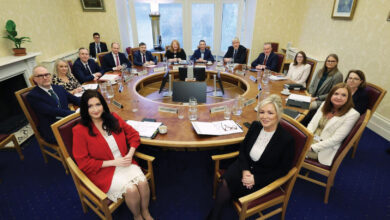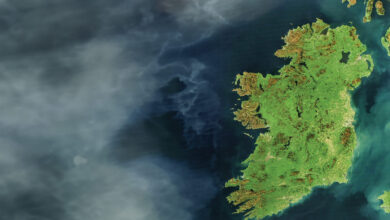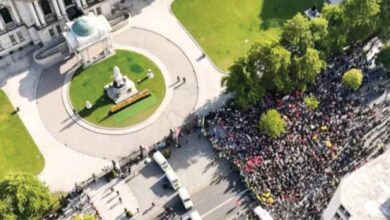Clinton: “The success of the GFA is dwindling”


Queen’s University’s recent awarding of an honorary doctorate to Hillary Clinton boasted an attendance of civic leaders from across the region. However, remarks made by the former First Lady reflected criticism of a political class at perpetual loggerheads in the context of Brexit and the absence of a Stormont Executive. agendaNi reports.
Clinton’s visit to Queen’s University provoked a mixed reaction in Northern Ireland’s public sphere, with warm welcomes from some parties contrasting starkly with vocal protests at the Lanyon gates from anti-war activists. However, the atmosphere inside the campus’ Whitla Hall building was one of overwhelming praise for the former Secretary of State, laudingly introduced as “the woman who should have been President” by Queen’s University’s Adrienne Scullion.
Clinton, however, was limited in her own praise for Northern Ireland’s leadership, on whom she called upon to “put quarrels aside” and ensure “peace, not paralysis” after nearly two years of political deadlock. During her acceptance speech, attended by Michelle O’Neill, Naomi Long, Peter Robinson and others, Clinton proposed an “interim community government” to navigate Northern Ireland through ongoing negotiations with the European Union. In a thinly veiled criticism of the negotiations, Clinton argued that “Brexit is larger than local political divides”. The honorary graduate stated that whilst current divisions are “deeply felt”, the transition of Northern Ireland outside of the EU extends “way beyond politics as usual”.
The former Presidential-hopeful was celebrated by most in attendance amidst a high security presence. She was awarded the degree of Doctor of Laws (LLD) for her “exceptional public service in the USA and globally”, and particularly for her “outstanding” contribution to negotiations in Northern Ireland which culminated in the Good Friday Agreement in 1998. The visit of the Clintons to Belfast in 1995 was the first of a sitting President to Northern Ireland, at a critical phase in peace negotiations. The contribution of US diplomats is widely considered to have fostered an atmosphere of cooperation in the region at a time when community relations were faltering.
Clinton’s reflections on changes in Northern Ireland formed a rallying call for embattled politicians to embrace the “spirit of compromise” seen in Belfast 20 years previously. “The success of the Agreement has been dwindling over the years,” said Clinton, “and 20 years makes it very easy to take peace for granted.” She continued her appeal to politicians, claiming that: “The world is watching, Northern Ireland has been a symbol to people everywhere, democracy’s power to transcend divisions and deliver prosperity, peace and progress.”
Not all aspects of Clinton’s speech were well received, however. Speaking of a visit to the “bombed Europa Hotel” in Belfast City Centre, she spoke of “broken windows, uninhabitable parts of the hotel and rubble everywhere”. This claim was rejected by sections of the media and former hotel staff, who reminded observers that the last explosive detonation in the area occurred in 1993 – two years before her visit.





